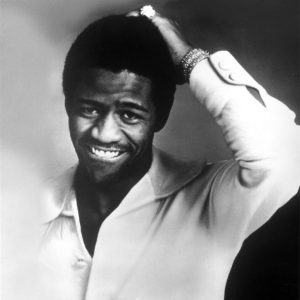calsfoundation@cals.org
Al Green (1946–)
Al Green is one of Arkansas’s best-known singers, with a career that has ranged from rhythm and blues (R&B) to pop to gospel and a combination. Green’s distinctive falsetto singing style continues to thrill fans old and young, and he remains an active soul singer from an era that also produced Sam Cooke, Otis Redding, and Marvin Gaye.
Al Greene (he later dropped the last “e”) was born on April 13, 1946, in Forrest City (St. Francis County) and grew up in a large African American family that sang gospel music. When his sharecropper father moved the family to Grand Rapids, Michigan, Green was only nine but sang with his siblings in the Green Brothers. When he began listening to the non-gospel sounds of Jackie Wilson, Green’s father dismissed sixteen-year-old Green from the group.
Green was later recruited by a local band, the Creations, later renamed Al Green and the Soul Mates, and in 1967, they recorded a single, “Back Up Train,” which hit No. 5 on the R&B charts. After a couple of years of struggling, Green was in a Midland, Texas, club in 1969 when he met Willie Mitchell, a Memphis, Tennessee, bandleader and an executive with that city’s soul record label, Hi Records. Mitchell persuaded Green to move to Memphis and let Mitchell shape his career and sound.
Green’s first chart hit, “Tired of Being Alone,” reached No. 11 in 1971. It was followed at the end of that year by his only No. 1 hit, “Let’s Stay Together.” He had six other Top 10 hits, all released between 1972 and 1974.
Fame and fortune followed, but Green suffered a couple of infamous career-changing moments. A former girlfriend entered Green’s home while he was bathing, poured a pot of boiling grits on him, then used his gun to kill herself. The 1974 incident resulted in second-degree burns on Green’s stomach, arm, and back. Two years later, he bought a church, paying for the building using a blank piece of paper as a check. His personal life continued to be turbulent, however. In June 1977, he married Shirley Kyles, but they were divorced in 1983, and she later alleged—and he acknowledged under oath—that he had been abusive during their relationship.
The church, the Full Gospel Tabernacle, is on Hale Road in Memphis, not far from Elvis Presley’s famous residence, Graceland. Green was ordained the pastor of his church, but it was another three years before he gave up his pop music career; he fell off an Ohio stage in 1979 and viewed the incident as a message from God.
Green then began recording and performing gospel music exclusively and has earned eight Grammy Awards in the gospel genre. Although his 1980s albums were devoid of pop sounds, he did a 1982 stint on Broadway with Patti LaBelle in a gospel musical, Your Arms Too Short to Box with God, and he recorded a duet with Annie Lennox (then one-half of Eurythmics), “Put a Little Love in Your Heart,” on the soundtrack of the 1988 Christmas movie Scrooged.
In 1984, documentary filmmaker Robert Mugge released a film, Gospel According to Al Green, which covered Green’s early life and contained footage shot in his church. Lyle Lovett teamed with Green in 1994 on a Grammy-winning song, “Funny How Time Slips Away,” which was part of a collection of duets, Rhythm, Country and Blues. Green toured a bit and appeared on network television shows. In 1997, he got the box-set treatment for the first time with Anthology, a four-disc set. In 2004, another four-disc set, The Immortal Soul of Al Green, was released.
In 1995, Green was inducted into the Rock and Roll Hall of Fame and also released his first secular album in years, Your Heart’s in Good Hands. In 2000, HarperEntertainment, an imprint of HarperCollins Publishers, published his 343-page autobiography, Take Me to the River. In 2004, he was inducted into the Gospel Music Hall of Fame. Green was the recipient of Kennedy Center Honors in 2014.
As the twenty-first century began, Green returned fully to the world of pop music and touring by reuniting with Willie Mitchell, the producer who had guided Green’s early career. The two, who had not collaborated since 1985, worked together on I Can’t Stop, Green’s 2002 debut on Blue Note Records, and the follow-up, Everything’s OK, in 2005.
In 2008, Green released Lay It Down. Since then, he has released a handful of cover tracks, including Freddy Fender’s “Before the Next Teardrop Falls” (2018), Lou Reed’s “Perfect Day” (2023), and R.E.M.’s “Everybody Hurts” (2024). He lives in Memphis, where he serves as a pastor to his church and has six children.
An exhibition of artifacts and photographs at the Smithsonian National Museum of African American History and Culture in Washington DC, Spirit in the Dark: Religion in Black Music, Activism, and Popular Culture, on display from November 2022 to November 2023, included Green.
For additional information:
Green, Al. Take Me to the River. New York: HarperEntertainment, 2000.
McDonough, Jimmy. Soul Survivor: A Biography of Al Green. New York: De Capo Press, 2017.
Mugge, Robert, dir. Gospel According to Al Green. VHS, DVD. Winstar, 1999.
Jack W. Hill
Arkansas Democrat-Gazette






Al Green just has that style and mellow voice that takes me to a different time and place. I’m listening to him right now, as he’s a large part of my playlist. What a great artist. Try to listen without getting hooked; bet you can’t, lol. Peace, Al.
Al Green has always been one of my favorite artists. His music has inspired me, and every message in his music has had so much meaning and a great impact in my life.